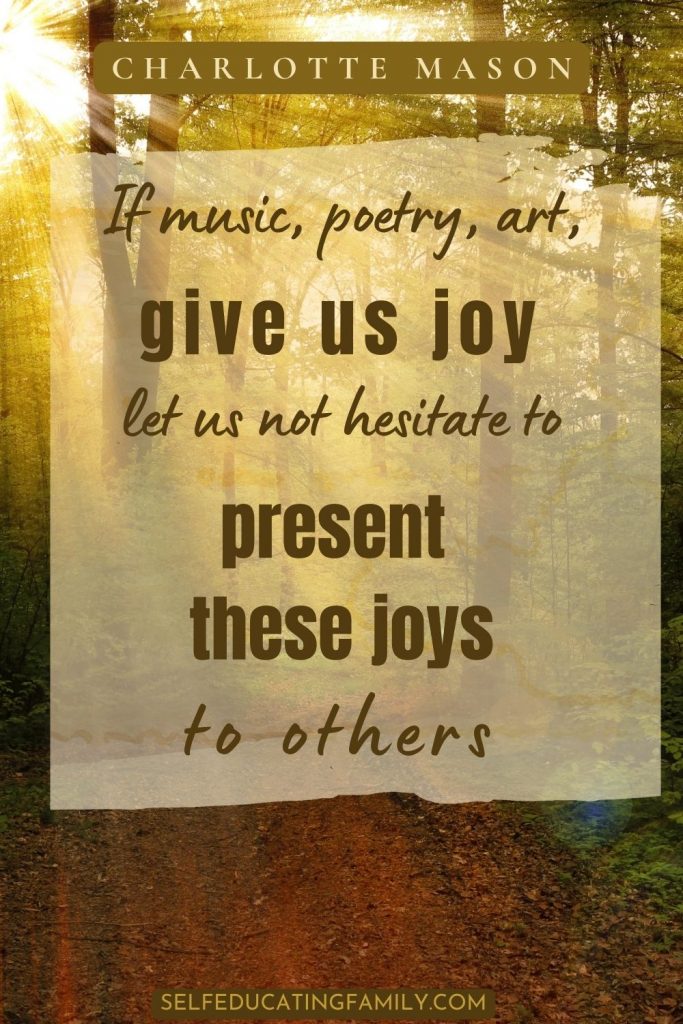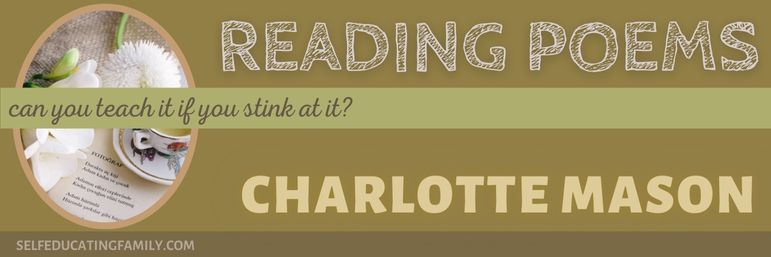Can you teach something you aren’t good at?
I was not good at reading poems.
A homeschool mom always has weaknesses – maybe you think you can’t teach math because you never “were good” at math.
Well, I’ve always been good at math, so no worries there. But I never was all that fond of over-analyzing anything in the literature and poetry area. Ok, I stunk at it.
Charlotte Mason’s methods include Reading Poems
So when I realized that poetry was an important part of a generous Charlotte Mason curriculum, I was a bit skeptical. I wasn’t even convinced that kids needed fairy tales.
Sacrilege, right?
Anyway, I thought studying “Poetry” meant you had to analyze a bunch of arranged words to death.
But it’s not.
I was wrong about Poetry
Studying poetry might actually be fun.
At its basic level, it involves reading poems. That’s the easiest level to start with.
It might push our brains a bit to read verse, but even our brains need exercise. Just because living ideas might be harder to chew on at first, doesn’t mean we should throw them out and reach for the potato chips.
Since I have learned to appreciate reading poems, I am now convinced that children should be exposed to poetry regularly and broadly in order to experience great ideas and a depth of understanding of the world. And since I learned at a later age to appreciate poetry, I think it’s probably good for adults too.
What follows is my attempt to convey how to approach reading poems if you are reluctant to teach the subject. It may be helpful for little ones who make the “rolling-eyes-oh-no!” face too.
Charlotte Mason and Poetry Studies
Charlotte Mason believed that poetry, along with fable and other fiction, could present what she called “essential” truth—a “Truth of Art”—which helps us learn among other things “morals and manners; what to do in given circumstances; what will happen if we behave in a certain way.”1
She also thought it makes people more interesting. Her conclusion is that interesting people don’t succumb as easily to vices like drunkenness and gluttony. “The child who watches his brother’s plate, and longs for what he thinks is the better helping, is a child who has nothing better to think of.”2
I have to say, that cracked me up a little bit. Only because of how she approached the topic of educating children. I never would have made any connection between reading a poem to a child and forming character—the idea that a poem can save you from overeating twenty years later. It’s an interesting concept to consider, but it may be beyond the scope of this guide.
Regardless, here’s more on this idea that teaching a child is much broader than just a single child.
How important is educating a child?
“Education is a World Business.––Next, we may have poetry, or art, or philosophy; we cannot tell; but two things are incumbent upon us,––to keep ourselves and our children in touch with the great thoughts by which the world has been educated in the past, and to keep ourselves and them in the right attitude towards the great ideas of the present. It is our temptation to make too personal a matter of education, to lose sight of the fact that education is a world business, that the lessons of the ages have been duly set, and that each age is concerned, not only with its own particular page, but with every preceding page.”
Charlotte Mason: School Education, Volume 3: The Home Education Series, p. 160
The takeaway for me was that poetry is pretty important for the imagination and growth of children. And that the great ideas of the world, past and present, continue to be great ideas that need to be exposed to people.
“If music, poetry, art, give us joy, let us not hesitate to present these joys to others.”
Charlotte Mason
How do I select good poetry?
Charlotte Mason seemed to suggest that you should develop your sense of “what makes good literature/ poetry/ reading material” through practice, attention, and intuition. You’re looking for “living books” type of material in poetry.
Living books
Living books are books that engage the reader with vital ideas.
Comparison Example: The Literature Test
Charlotte Mason, in Ourselves in the section called “How to recognise(sic) Literature”, gives two poems to compare. One is an example of “delightful literature” and the other, while “true, thoughtful and well expressed” is not.
Delightful
“That time of year thou mayst in me behold
When yellow leaves, or none, or few, do hang
Upon those boughs which shake against the cold,
Bare, ruined choirs, where late the sweet birds sang.”
Not
“Household Deities!
Then only shall be happiness on earth
When man shall feel your sacred power and love
Your tranquil joys.”
* Disclosure: This post contains affiliate links, meaning that if you make a purchase after clicking through, SelfEducatingFamily will receive a small commission at no extra cost to you.
Analysis
I know I said I dislike literary analysis, but Charlotte Mason is giving a teaching point here. She says the first passage has a “certain charm”, which I can see and agree with.
So I can see that the first passage is clearly superior.
I just can’t see anything positive about the other passage. To me, that second passage reminds me of all the times middle school teachers tried to force their opinion on me of why poetry was fabulous. All the stuff they chose felt like the second passage to me. I’m kind of getting the shakes…
I’m probably just remembering it poorly.
The takeaway is to select delightful literature.
“The thing is, to keep your eye upon words and wait to feel their force and beauty; and, when words are so fit that no other words can be put in their places, so few that none can be left out without spoiling the sense, and so fresh and musical that they delight you, then you may be sure that you are reading Literature, whether in prose or poetry. A great deal of delightful literature can be recognised only by this test.”
Charlotte Mason, from Ourselves, Vol 4, p. 40-41
She’s saying to select the first passage, not the second.
Repeat:
To pick good poems and good literature:
- Feel the force and beauty of the words
- Can no other words have been better?
- Are the words fresh and musical?
- Do the words delight you?
If so, you are reading literature – “living books”.
Keep Learning
Get my Free Curated Poetry QuickStart Guide
Click below to go to my ItList “Add Poetry to Your Day: Quick Start Guide”. It’s free and it will help you get started with Poetry Studies.
Articles on Charlotte Mason homeschooling:
- Charlotte Mason Homeschooling: A Generous Curriculum
- Evaluating your Charlotte Mason Homeschooling (my guest post on Homeschool.com)
- Reading Poetry Aloud
- 4 Ways to Teach Poetry Appreciation
- Curated Poetry Studies
More on reading poems:
Living Books of Poetry for young people
These are some of the collections of poetry that started to change my mind about reading poems. These are delightful to our family. Check them out at your library first before you add them to your home library.
- When We Were Very Young and Now We Are Six by A.A. Milne
- A Child’s Garden of Verses by Robert Louis Stevenson
- The Pelican Chorus by Edward Lear (with the FAVORITE “Owl and the Pussycat”)
If you want an all-in-one Charlotte Mason method for poetry with selected poems, you can try this one.
- A Year of Poetry Tea Time by Christine Owens

Notes
1 Charlotte Mason: Ourselves, Volume 4: The Home Education Series, p. 160.
2 Ibid. p. 201.
